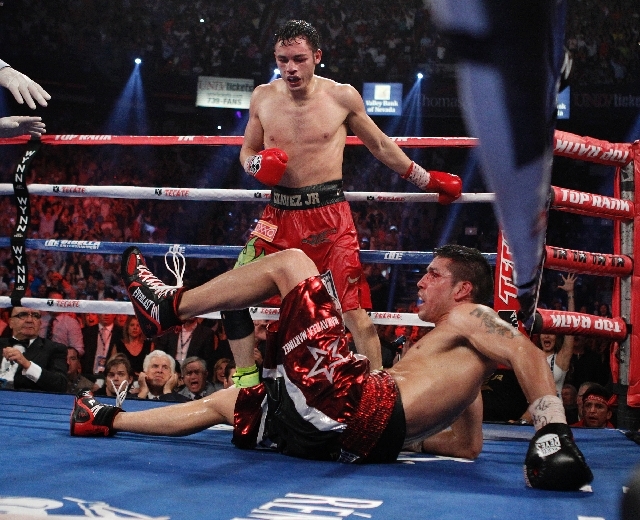Time right for commission to ease pot sanction against boxers

They say timing is everything in life, and the timing couldn’t be better for the Nevada Athletic Commission.
The NAC has a chance to get it right.
The state outfit that oversees boxing has an opportunity for a do-over in its awful decision in March to slam boxer Julio Cesar Chavez Jr. with a draconian $900,000 fine after he tested positive for trace elements of marijuana metabolite following his Sept. 15 title fight in Las Vegas against Sergio Martinez. Chavez lost the match. He also admitted using pot, which no reasonable person believes is a performance-enhancing drug.
The fine was so extraordinary that the Marijuana Policy Project, the national legalization group, leased a billboard that reminded passers-by that most Nevadans favor changes in the law. The issue made news in sports pages across the country.
The fine comes at a time some states are legalizing recreational pot use and others are giving winking approval by passing medical marijuana laws.
Although the Nevada Legislature rejected legalization this session, the issue wasn’t laughed out of Carson City. The medical marijuana argument was made articulately by representatives of both sides of the political aisle. Perhaps legislators appreciate the irony of the continued vilification of the drug in a state that celebrates alcohol consumption like no other in the union. Not to acknowledge that fact is an act of willful blindness.
In 2013, former presidents have called for the decriminalization of marijuana. Its use is obviously perceived very differently today than it was even a few years ago.
But when it came time to sanction Chavez, he was hit with a fine that amounted to 33 percent of his purse for the Martinez fight. Commission Executive Director Keith Kizer relied on recent precedent in defending the fine, noting that Ultimate Fighting Championship contender Nick Diaz had been hit with the 33 percent solution after testing positive following a match in 2011. (And he had a California medical marijuana card.)
In an email response to my March inquiry, Kizer offered, “The drugs prohibited by the NSAC (Nevada State Athletic Commission) are taken from the list supplied by the World Anti-Doping Agency. … That list is used by most (if not every) legitimate sports commission. Equally well publicized by the NSAC are the consequences of running afoul of our rules and regulations.
“NSAC licensees know the consequences of their potential violations.”
It’s also true the Nevada commission even two decades ago departed from its 33 percent sanction when it saw fit. To take a hard line on pot in 2013 seems misguided.
But, as they say, timing is everything. And the NAC appears to have a window of opportunity to update its hard-line marijuana stance.
After all, the World Anti-Doping Agency recently did just that. In a meeting earlier this month, the WADA executive committee agreed to significantly increase the threshold level for marijuana metabolite. One reason was to try to ensure an athlete wouldn’t be sanctioned for using the drug outside competition.
From a WADA news release: “All samples received by laboratories post May 11 will be subject to the new threshold level. As a matter of fairness and to provide consistency, WADA advises not to pursue cases currently in the results management phase where the reported concentration is less than the new threshold (150 ng/mL). Also, for any analyses conducted from May 11 onwards, laboratories are requested not to report any THC case result below the acceptable threshold, regardless of the sample receipt date.”
It doesn’t mean the WADA is legalizing marijuana use or encouraging it. Far from it. It’s an acknowledgment that times have changed.
It’s time Nevada’s boxing commission did the same.
And the timing couldn’t be better.
John L. Smith’s column appears Sunday, Tuesday, Wednesday and Friday. Email him at Smith@reviewjournal.com or call 702-383-0295. Follow him on Twitter @jlnevadasmith.